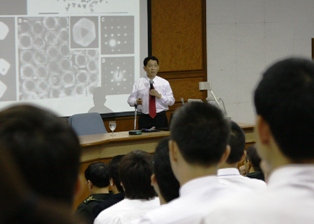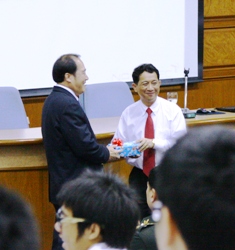
Nanomedicine is the medical application of nanotechnology. The approaches to nanomedicine range from the medical use of nanomaterials, to nanoelectronic biosensors, and even possible future applications of molecular nanotechnology. Current problems for nanomedicine involve understanding the issues related to toxicity and environmental impact of nanoscale materials.
Speaking to a group of first year students from the Medical Cadets of Phramongkutkloo College of Medicine at Kasetsart University, Prof. Siririrug Songsivilai, Executive Director of NANOTEC said in his presentation “Advancement of nano-medicine” that the nanotechnology we are currently seeing in Thailand is considered Phase 1 generation mostly dealing with nano-materials. Phase 2 which is about 4-5 years from now will focus on nano-electronics, and 15-20 years from now will focus on nano-medicine. The talk focused on introductory of nanotechnology, nanotechnology in medicine, current nanotechnology in the market, and nanosafety. Prof. Sirirurg said he is confident that within 30 years from now we will see such advancement as nanoprobes and nano-robots that can live within us and fight diseases/virus on our behalf.
Under an agreement between Phramongkutkloo College of Medicine and Kasetsart University, all first year medical students (about 100 students per year: 40 women and 60 men) will spend their one year study at the Faculty of Science, Kasetsart University. After which they will return to the college of medicine to continue their study.
